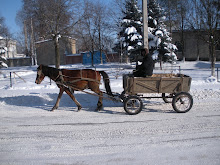 According to the Eastern Orthodox calendar, I am obliged to wish you all a new year greeting. That makes today New Year's eve and tomorrow the start of the new year, marked on Saint Vasile's Day. The boys in this photo are my frisbee mates during the spring and summer. Tonight they came to wish us a happy new year in the same style as the boys in the short film from last year--by reciting one the poems that have memorized. It's called "urătura" (oo-ra-toora), and as you can see from last year, it's more of a chant really, and always accompanied by a bell. Also, as I mentioned before, this tradition resembles Halloween a bit, in the sense that after the children recite the appropriate greeting, the host/hostess dishes out candy, money, and loaves of celebratory bread (colac). They even come ready with bags to stow all the goods.
According to the Eastern Orthodox calendar, I am obliged to wish you all a new year greeting. That makes today New Year's eve and tomorrow the start of the new year, marked on Saint Vasile's Day. The boys in this photo are my frisbee mates during the spring and summer. Tonight they came to wish us a happy new year in the same style as the boys in the short film from last year--by reciting one the poems that have memorized. It's called "urătura" (oo-ra-toora), and as you can see from last year, it's more of a chant really, and always accompanied by a bell. Also, as I mentioned before, this tradition resembles Halloween a bit, in the sense that after the children recite the appropriate greeting, the host/hostess dishes out candy, money, and loaves of celebratory bread (colac). They even come ready with bags to stow all the goods."The urătura is a new year's greeting extolling the homemakers, farmers, and livestock keepers. It is a greeting for those that love work, and for those that provide for the rest of us. It glorifies the work of the country people, who are charged with caring for the sanctity of the land. It is to celebrate him with sweat on his forehead as he ensures us rich fruits and an abundance of everything.
Modern verses may also include wishes for success in the recipient's village, and for those born in the coming year. The urătura always ends with a verse for the good of humankind, for everyone to have rich fruits, and to be happy and healthy in the new year."
Tomorrow morning, the children will come again. This part of the Moldovan New Year's celebration is called, "the sowing" (may the agrarian tradition continue as long as the soil will support it!). The children will recite another poem, and throw grain on our threshold as they do. Tomorrow's "sowing" may go something like the poem Capcelea included in my book:
To snow
To rain,
To morning dew drops,
And for wheat to bud,
Rich with fruit!
To bring us hope
While passing through danger.
So children will grow,
And flower for many years
Like apples,
Like pears,
In the middle of summer
And in springtime.
Strong like stone,
Quick like an arrow,
Strong like iron,
Hot like steal.
To this year and many to come!
I'm sure most children will come deliver lines like this because their mothers compel them. But unlike why I can't tell you why fruitcake is an American Christmas item, I can tell you why the tradition of "the sowing" began, at least, according to Capcelea.
"In the old days, it was considered that children needed to learn how to plant the seeds necessary for bread--the source of life and joy--to love the animals, and now how to grow them."
So how about a verse for the animals too?
For the lives of oxen and cattle
And your life also
To this year and many to come
With good health!
To be everything well!




























Thanks for posting this. We had some boys come to the house today singing a song, throwing grain, and asking for candy. I knew about this, and was prepared for it on January 1, but not today! I was looking online to read more about it and found your blog. We are missionaries living in Orhei. Where do you live?
ReplyDeleteThis comment has been removed by the author.
ReplyDeleteStacy,
ReplyDeleteI hope this post helped! I live just 45 minutes north of Orhei, in the district of Singerei. Have you met the Peace Corps Volunteers in Orhei? How long have you been here?
We have several friends from Singerei and have been through there several times. I haven't met any Peace Corps volunteers, but the woman who taught us Romanian also teaches the Peace Corps- Lilia Botnari. Did she teach you?
ReplyDeleteWoot, Singerei! Would your friends by any chance be part of the baptist community? I know we have two churches here, but I've never been to either. I worked with Liliana once at a weekend training last winter. I'm happy to hear you are working with her, she is a very skilled educator!
ReplyDelete